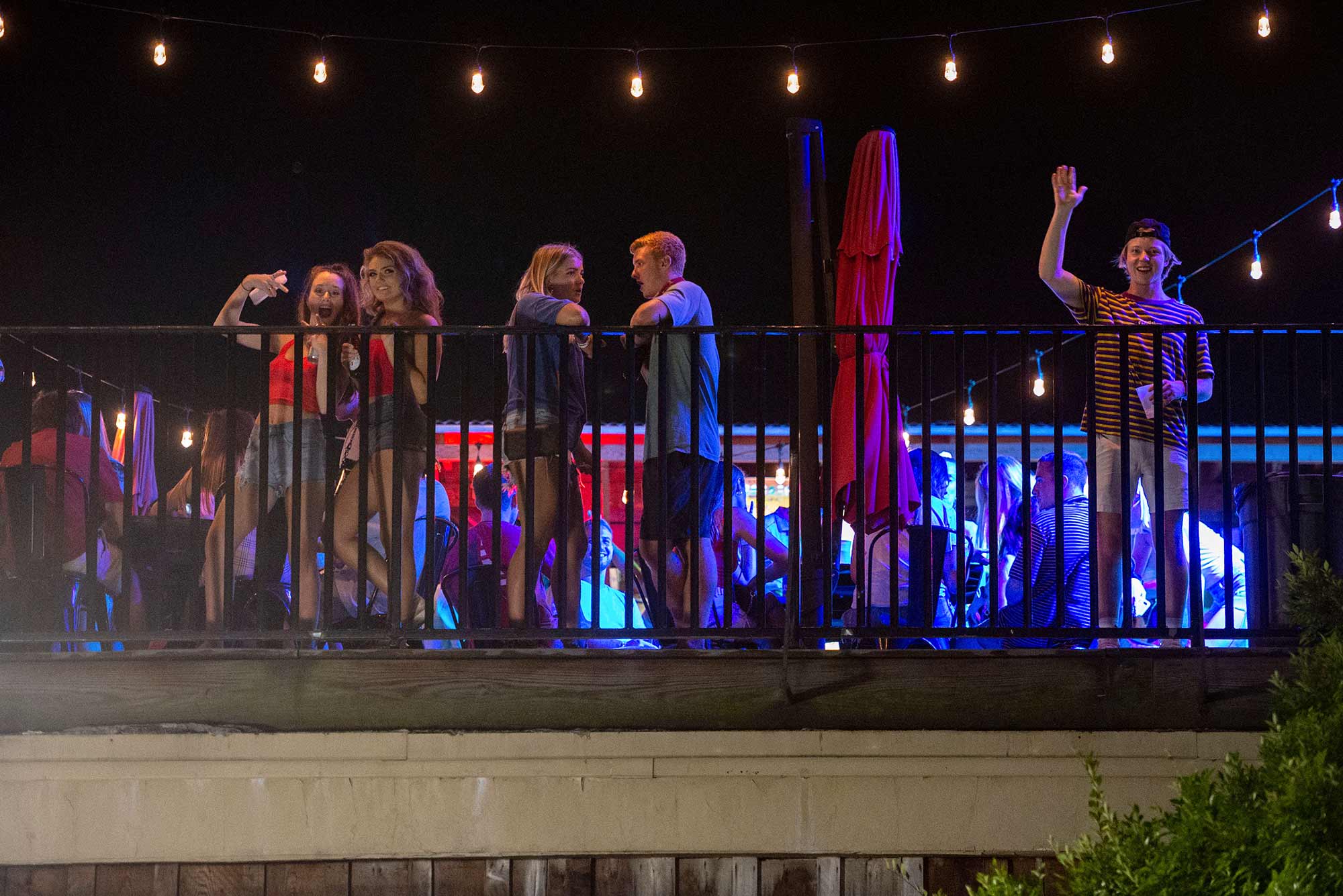BU Will Suspend Students Who Host or Attend Large Gatherings

Gatherings like this at the Bear Trap rooftop bar in Tuscaloosa, Ala., have resulted in 568 COVID-19 cases at the University of Alabama, one of dozens of campuses grappling with outbreaks as students return for the fall. Photo by Vasha Hunt/Associated Press
BU Will Suspend Students Who Host or Attend Large Gatherings
Warning encourages students to report violations, keep groups to less than 25
Party or even just gather in a crowd of 25 or more people and you’re out: that’s the bluntly worded message that BU sent to students Wednesday, reminding them that they are ultimately responsible for how safe, or unsafe, campus life will be in this time of the coronavirus.
While thanking students for distancing, masking, submitting their daily health attestations, and following the protocols for COVID-19 testing, Kenneth Elmore (Wheelock’87), BU associate provost and dean of students, wrote, “All of your efforts, however, to protect yourself and your household could be compromised if you choose to attend a large off-campus gathering, even for a brief period. There will be a few students who won’t take COVID-19 seriously and their stay in our community will be short-lived—if you host or attend a large off-campus or on-campus gathering, social, or party, you will be suspended from Boston University.”
On the Reddit page for Boston University, the news was swiftly greeted with strong reactions:
“What are your thoughts on this?” one student wrote. “I think that the suspensions + no tuition refund will deter a lot of students. Obviously there will still be the dumb ones who host parties but i think this will help a lot. I also think the 25 person limit is too great, maybe limit it to like 10 or something for large gatherings.”
Another student replied: “This is exactly the attitude I had hoped the administration would take for us to survive and thrive this semester.”
When one student wrote that BU was looking to blame students for an outbreak, another quickly replied: “If you’re having a 25+ person party and then anyone who went to the party gets sick and spreads it to other people….. You literally are to blame for that outbreak.”
Beyond urging students to speak to their peers who violate safety protocols, such as gathering in large groups or not wearing masks, Elmore said they could also report gatherings in violation of safety precautions on a 24-hour hotline (617-353-5050) or an online form.
The dean’s email went out amid reports of students on other campuses ignoring quarantines, party bans, and similar restrictions. With more than one third of the nation’s 5,000 campuses trying at least limited in-person classes, “early [COVID-19] outbreaks at dozens of colleges” have bedeviled administrators, the New York Times reports. Some schools, including the University of North Carolina at Chapel Hill and the University of Notre Dame, were forced to clear their campuses and return to remote learning.
Specifically, Elmore said, he will suspend for the fall semester students who host or attend on- or off-campus gatherings exceeding 25 people, which is not a random number, but follows the Massachusetts limit on indoor congregations. Suspended students will not be permitted to attend classes in person or remotely, he wrote, nor will they receive tuition refunds, or if applicable, room and board refunds.
In addition, “If your student organization, club sport, or team hosts a large (more than 25 people) gathering, social, party, or event, the organization will be suspended and University recognition withdrawn, at minimum, throughout the fall semester,” his email stated. “If you live on campus [in] student residences and violate these guidelines, you will have to move out of your room, suite, or apartment immediately and will not be permitted to live on campus for the remainder of the academic year.”
He noted that University-sanctioned events are not included and fall under another policy laying out conditions for such events.
Sean Richichi (ENG’22) welcomed Elmore’s warning. “I had hoped that BU administration would take that kind of step to ensure their policies for COVID are going to be followed,” he says. “They’re putting all this money into testing and trying to ensure everyone’s back on campus. So might as well enforce [against] the people that aren’t going to follow the policies.”
“I think the new rule makes a lot of sense,” agrees Mya Most (COM’23). “Under any other circumstances, my reaction would be different, but I think this is the best way to make sure that we all hold ourselves and each other accountable so that we can stay on campus and maintain the health and safety of Massachusetts. Stopping the spread of this virus is a community responsibility that we all need to uphold in order to keep everyone healthy.”
“I was skeptical about BU’s ability to handle the effects of the pandemic,” says Yannick De Guchteneere (CAS’21), “but policies like these make me hopeful about a safe and secure semester.”
Elmore wrote that he understands, from his own experience, the loneliness and cabin fever that pandemic restrictions have imposed on students. “However, in seeing my friends, I’ve incorporated a lot more planning in my socializing to be more thoughtful, less hapless, and more diligent about thinking about others.…I hope that I will not have to suspend anyone, and I know if we all work together, and remain committed to our goal of maintaining a healthy living and learning environment, we can and we will do this.”
Nathan Lederman (COM’22), Chloe McKim Jepsen (CAS’22), and Alexander Puri (COM’21) contributed to this report.

Comments & Discussion
Boston University moderates comments to facilitate an informed, substantive, civil conversation. Abusive, profane, self-promotional, misleading, incoherent or off-topic comments will be rejected. Moderators are staffed during regular business hours (EST) and can only accept comments written in English. Statistics or facts must include a citation or a link to the citation.